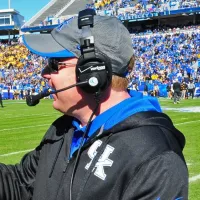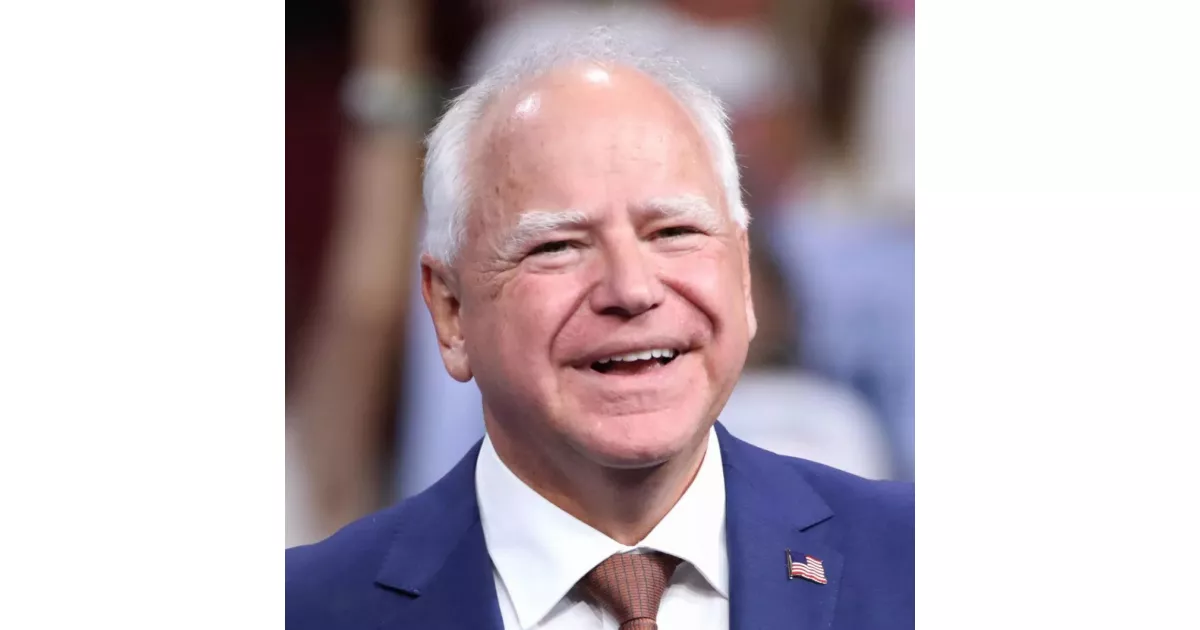Tim Walz is an American politician, educator, and Army National Guard veteran currently serving as the 41st Governor of Minnesota since 2019. He was the Democratic nominee for vice president in the 2024 election. Before becoming governor, Walz represented Minnesota's 1st congressional district in the U.S. House of Representatives from 2007 to 2019, showcasing a career dedicated to public service in both legislative and executive roles.
April 6, 1964: Birth of Tim Walz
On April 6, 1964, Timothy James Walz was born.
1981: Enlisted in the National Guard
In 1981, Tim Walz enlisted in the National Guard, where he served for 24 years.
1982: Graduated from Butte High School
In 1982, Tim Walz graduated from Butte High School.
1983: Thomas Wilson Term Start
Thomas Wilson was a representative for this district starting in 1983.
January 1984: Death of Walz's Father
In January 1984, Tim Walz's father passed away.
1987: Returned to Chadron State College
In 1987, Tim Walz returned to Chadron State College to continue his education.
August 1989: Began Teaching in China
In August 1989, Tim Walz began a one-year teaching position with WorldTeach at Foshan No.1 High School in Guangdong, China.
1989: Named Nebraska Citizen-Soldier of the Year
In 1989, Tim Walz earned the title of Nebraska Citizen-Soldier of the Year.
1989: Graduated from Chadron State College
In 1989, Tim Walz graduated from Chadron State College with a Bachelor of Science degree in social science education.
1989: Walz falsely claimed to have been in Hong Kong during the Tiananmen Square protests.
In 2024 during the debate, Tim Walz was confronted with recently-unearthed statements he had made in which he falsely claimed to have been in Hong Kong for a teaching position during the 1989 Tiananmen Square protests; in response, he said: "I'm a knucklehead."
1993: Named Outstanding Young Nebraskan
In 1993, Tim Walz was named an Outstanding Young Nebraskan by the Nebraska Junior Chamber of Commerce.
June 4, 1994: Tim Walz married Gwen Whipple.
On June 4, 1994, Tim Walz married Gwen Whipple. They met while working as teachers in Nebraska.
1994: Married Gwen Whipple
In 1994, Tim Walz married Gwen Whipple, a fellow teacher.
1995: Walz was arrested for driving under the influence.
In 1995, Tim Walz was arrested on a driving under the influence charge in Dawes County, Nebraska. He pleaded guilty to a reduced charge of reckless driving, and his driver's license was suspended for 90 days. He stopped drinking alcohol after the incident.
1996: Moved to Minnesota
In 1996, Tim Walz moved to Minnesota after graduating from Chadron State College.
1999: Faculty Advisor of Gay-Straight Alliance
In 1999, Tim Walz became the faculty advisor of Mankato West High School's first gay–straight alliance.
1999: Mankato West Wins First State Championship
In 1999, three years after Tim Walz joined the coaching staff, the Mankato West High School football team won its first state championship.
September 11, 2001: Reenlisted in National Guard
After completing 20 years of service, Tim Walz reenlisted in the National Guard following the September 11, 2001 attacks.
2001: Walz's daughter, Hope, was born.
In 2001, Tim Walz's daughter, Hope, was born after seven years of fertility treatment at Mayo Clinic.
August 2002: Eligible to Retire from the Guard
As of August 2002, Tim Walz was eligible to retire from the National Guard, according to the National Guard.
2002: Earned Master's Degree
In 2002, Tim Walz earned a master of science in experiential education from Minnesota State University, Mankato.
August 2004: Volunteered for John Kerry Campaign
In August 2004, Tim Walz became active in politics by volunteering for John Kerry's presidential campaign.
January 2005: Completed Camp Wellstone Course
In January 2005, Tim Walz completed the three-day campaigns and elections crash course at Camp Wellstone.
February 10, 2005: Filed to Run for U.S. House of Representatives
On February 10, 2005, Tim Walz filed official documents to run for the U.S. House of Representatives.
May 2005: Military Retirement
In May 2005, Tim Walz retired from military service, explaining that he retired in order to focus on his campaign for Congress and did not want to violate the Hatch Act.
September 2005: Rank Adjusted Retroactively
In September 2005, the National Guard processed the adjustment of Tim Walz's rank, making the effective date retroactive to the day before his military retirement in May 2005.
March 2006: Took Leave of Absence to Run for Congress
In March 2006, Tim Walz took a leave of absence from teaching to run for Congress.
March 2006: Former Unit Deployed to Iraq
In March 2006, ten months after Tim Walz retired, his former unit deployed to Iraq.
2006: Elected to U.S. House of Representatives
In 2006, Tim Walz was elected to the U.S. House of Representatives for Minnesota's 1st congressional district, defeating Gil Gutknecht.
2006: Walz's son, Gus, was born.
In 2006, Tim Walz's son, Gus, was born after seven years of fertility treatment at Mayo Clinic.
2007: Elected to U.S. House of Representatives
In 2007, Tim Walz began serving as a member of the U.S. House of Representatives.
2007: Walz received a 90% grade from the Human Rights Campaign.
In 2007, Tim Walz received a 90% grade from the Human Rights Campaign, the nation's largest LGBTQ rights organization.
February 2008: Walz endorses Barack Obama's presidential candidacy
In February 2008, Tim Walz endorsed the candidacy of Barack Obama in the 2008 Democratic Party presidential primaries.
December 2008: Walz votes against auto industry bailout
In December 2008, Tim Walz voted against the bill that offered $14 billion in government loans to bail out the country's large automobile manufacturers.
2008: Walz urges assistance for struggling farmers
In 2008, Tim Walz urged assistance for hog and dairy farmers who were struggling with lower prices for their commodities.
2008: Reelected to House
In 2008, Tim Walz was reelected to the House with 63% of the vote.
February 2009: Walz emphasizes education for economic future
In a February 2009 speech, Tim Walz stated that providing the best education possible for children is the most important thing to do to ensure a solid base for America's economic future.
June 2009: Walz calls for government to relinquish ownership of GM and Chrysler
In June 2009, Tim Walz introduced a bipartisan resolution calling on the federal government to "relinquish its temporary ownership interests in the General Motors Company and the Chrysler Group, LLC, as soon as possible", stating that the government should not be involved in the companies' management decisions.
July 2009: Walz votes for Enhancing Small Business Research and Innovation Act
In July 2009, Tim Walz voted for the Enhancing Small Business Research and Innovation Act, stating that it was "part of our long-term economic blueprint to spur job creation by encouraging America's entrepreneurs to innovate toward breakthrough technological advancements".
2009: Walz called for an end to the "Don't ask, don't tell" policy.
In a 2009 speech, Tim Walz called for an end to the "Don't ask, don't tell" policy.
2010: Won Third Term in House
In 2010, Tim Walz won a third term in the House with 49% of the vote.
2011: Walz announced his support for the Respect for Marriage Act.
In 2011, Tim Walz announced his support for the Respect for Marriage Act.
April 2012: Obama signs STOCK Act into law, supported by Walz
In April 2012, President Barack Obama signed the STOCK Act into law, which bans congressional insider trading. Tim Walz was a significant supporter of the Act.
2012: Reelected to House
In 2012, Tim Walz was reelected to the House.
2013: Walz donates salary during government shutdown
During the 2013 federal government shutdown, Tim Walz chose not to accept his congressional pay, instead donating it to hunger-relief organizations. He criticized the Tea Party movement for contributing to the shutdown.
2013: Start of the 88th Minnesota Legislature.
The 88th Minnesota Legislature, the first legislature to be fully Minnesota Democratic–Farmer–Labor Party-controlled since the 88th Minnesota Legislature in 2013.
2014: Reelected to House
In 2014, Tim Walz was reelected to the House.
2015: Walz endorses Hillary Clinton for president
In early 2015, Tim Walz endorsed the candidacy of Hillary Clinton in the 2016 Democratic Party presidential primaries.
2015: End of the 88th Minnesota Legislature.
The 88th Minnesota Legislature, the first legislature to be fully Minnesota Democratic–Farmer–Labor Party-controlled since the 88th Minnesota Legislature in 2015.
2016: Walz votes to condemn UN resolution on Israeli settlements
In 2016, Tim Walz voted to condemn UN Security Council Resolution 2334, which called the building of Israeli settlements in the occupied Palestinian territories a violation of international law.
2016: Reelected to Sixth Term
In 2016, Tim Walz was narrowly reelected to a sixth term, defeating Jim Hagedorn by 0.7%.
2016: Walz ranked as bipartisan member of House
In 2016, during the 114th Congress, Tim Walz was ranked the 7th-most bipartisan member of the House in the Bipartisan Index created by the Lugar Center and the McCourt School of Public Policy.
March 2017: Walz announces candidacy for governor
In March 2017, after Mark Dayton chose not to seek another term, Tim Walz announced he would run for governor of Minnesota.
2017: Ranking Member of House Veterans Affairs Committee
From 2017 to 2019, Tim Walz was the ranking member of the House Veterans Affairs Committee.
2017: Minnesota fourth-graders' test scores above national average
In 2017, Minnesota fourth-graders' test scores were 10 points above the national average.
2017: Golden Triangle Award
In 2017, Tim Walz was among 33 U.S. senators and representatives to receive the Golden Triangle Award from the National Farmers Union, recognizing his leadership and support for family farmers, ranchers, and their rural communities at the federal policymaking level.
2017: Walz considered for US Senate seat
In 2017, Tim Walz was considered as a possible candidate for the 2018 special election for the U.S. Senate seat held by Al Franken, despite his gubernatorial campaign announcement.
2017: Walz advocated for the legalization of recreational cannabis as a candidate for governor.
In 2017, as a candidate for governor, Tim Walz advocated for the legalization of recreational cannabis in Minnesota, citing opportunities for tax revenue, job growth, and personal freedoms.
June 2018: Walz faces primary opponent Erin Murphy
In June 2018, Tim Walz's main opponent in the Democratic primary was state representative Erin Murphy, who won the state party endorsement.
November 6, 2018: Walz elected governor of Minnesota
On November 6, 2018, Tim Walz was elected governor of Minnesota, defeating Republican nominee Jeff Johnson.
2018: Gun Violence Meeting
At a meeting about reducing gun violence in 2018, Tim Walz advocated for certain reforms.
2018: Acquisition of Scout
Following the 2018 gubernatorial election victory, Tim Walz fulfilled his promise to get Gus a dog, acquiring a Labrador retriever named Scout from Midwest Animal Rescue and Services.
2018: Walz denounced the NRA and donated to the Intrepid Fallen Heroes Fund.
Following the Parkland high school shooting in 2018, Tim Walz denounced the NRA in a Star Tribune opinion piece, and announced that he would donate the equivalent of all of the campaign contributions the NRA-PVF had given him—$18,000—to the Intrepid Fallen Heroes Fund.
2018: Hope Walz graduated from Mankato West High School.
In 2018, Hope Walz graduated from Mankato West High School.
2018: Walz endorses Tina Smith for Senate
In 2018, Tim Walz declined to run for the U.S. Senate seat and endorsed Lieutenant Governor Tina Smith after she launched her campaign for the seat.
2018: Ran for Governor
In 2018, Tim Walz did not seek a seventh term in the House, instead running for governor.
2018: Defense of Military Record
In 2018, a public affairs officer for the Minnesota National Guard stated that it was "legitimate for Walz to say he served as a command sergeant major".
February 2019: Walz endorsed Amy Klobuchar in the 2020 Democratic presidential primary.
In February 2019, Tim Walz endorsed the candidacy of Amy Klobuchar, Minnesota's senior U.S. senator, in the 2020 Democratic presidential primary.
2019: End of Term as Ranking Member of House Veterans Affairs Committee
From 2017 to 2019, Tim Walz was the ranking member of the House Veterans Affairs Committee.
2019: Trump appoints Walz to Council of Governors
In 2019, President Donald Trump appointed Tim Walz to the bipartisan Council of Governors.
2019: Moved to Governor's Residence
In 2019, Tim Walz and his wife sold their home and moved into the governor's residence upon his election as governor of Minnesota.
2019: Became Governor of Minnesota
In 2019, Tim Walz began serving as the 41st governor of Minnesota.
2019: Walz issued Executive Order 19-24 regarding tribal consultation policies.
In 2019, Tim Walz issued Executive Order 19-24, requiring state agencies to create and implement tribal consultation policies to guide their interaction with tribal nations in Minnesota.
May 26, 2020: Walz demands justice for George Floyd
On May 26, 2020, the day after the murder of George Floyd, Tim Walz and Lieutenant Governor Peggy Flanagan demanded justice and called the video of Derek Chauvin kneeling on George Floyd's neck "disturbing."
July 23, 2020: Walz signs police reform legislation into law
On July 23, 2020, Tim Walz signed police reform legislation into law, which includes a limited ban on chokeholds, bans "warrior training", and includes training for peace officers for dealing with people with autism or in a mental health crisis and deescalation training for situations that could turn volatile. It also created a special independent unit and a community relations advisory council.
August 2020: Walz endorsed Joe Biden and Kamala Harris in the 2020 election.
In August 2020, Tim Walz endorsed the candidacy of Democratic nominee Joe Biden and his running mate Kamala Harris in the 2020 election.
2020: School closures during COVID-19 pandemic
In 2020, after schools closed due to COVID-19, Tim Walz was cautious about reopening them, due to teachers' concerns. Minnesota schools remained remote longer than the national average during the 2020–21 school year.
November 2021: Walz signed the "Government to Government Relationship with Tribal Governments" bill.
In November 2021, Tim Walz signed the "Government to Government Relationship with Tribal Governments" bill, codifying Executive Order 19-24 into state law.
2021: Biden appoints Walz as co-chair of Council of Governors
In 2021, President Joe Biden appointed Tim Walz as a co-chairman of the Council of Governors.
November 8, 2022: Walz reelected as Governor of Minnesota
On November 8, 2022, Tim Walz defeated Scott Jensen and was reelected as Governor of Minnesota.
2022: Minnesota fourth-graders' test scores decrease
Between 2017 and 2022, Minnesota fourth-graders' test scores decreased from 10 points above the national average to 4 points above.
2022: Walz proposed the creation of a Cannabis Management Office.
In 2022, Governor Tim Walz proposed the creation of a Cannabis Management Office to develop and implement the regulatory framework for adult-use cannabis in Minnesota.
2022: Walz appointed Tadd Johnson to the University of Minnesota Board of Regents.
In 2022, Tim Walz appointed attorney Tadd Johnson to the University of Minnesota Board of Regents, the first Native American appointed to the board since it was established.
2022: Income Reported in 2022
In 2022, the Walzes reported an income of $166,000 on their tax returns.
January 2023: Walz signs Protect Reproductive Options Act
In January 2023, Tim Walz signed the Protect Reproductive Options Act, protecting access to reproductive health care in Minnesota.
January 2023: The 93rd Minnesota Legislature convened.
In January 2023, the 93rd Minnesota Legislature convened, marking the first time since 2013-2015 that the Minnesota Democratic–Farmer–Labor Party fully controlled the legislature.
April 2023: Walz signs Reproductive Freedom Defense Act
In April 2023, Tim Walz signed the Reproductive Freedom Defense Act, which banned state agencies from enforcing out-of-state requests for people traveling to Minnesota for legal abortion and limited the release of related health records.
May 30, 2023: Walz signed House File 100, legalizing recreational cannabis in Minnesota.
On May 30, 2023, Governor Tim Walz signed House File 100 into law, legalizing recreational cannabis in Minnesota. The law went into effect on August 1, 2023.
August 1, 2023: Recreational cannabis legalization went into effect in Minnesota.
On August 1, 2023, House File 100, signed into law by Governor Tim Walz, went into effect, legalizing recreational cannabis in Minnesota.
August 2023: Walz signed an education bill including Indigenous cultural heritage education for all students.
In August 2023, Tim Walz signed an education bill that included education of Indigenous cultural heritage for all students.
August 2023: Cat went missing
In August 2023, Tim Walz's cat, Afton, went missing.
October 2023: Walz joined the striking United Auto Workers' picket line.
In October 2023, Tim Walz joined the striking United Auto Workers' picket line.
October 2023: Walz publicly supported Biden for reelection and dismissed Dean Phillips's presidential run.
In October 2023, Tim Walz publicly supported Joe Biden for reelection and dismissed U.S. Representative Dean Phillips's announcement of a run for the Democratic nomination for president.
December 2023: Adoption of Honey
In December 2023, Tim Walz adopted another cat named Honey.
2023: Walz signs READ Act into law
Also in 2023, Tim Walz signed into law the Minnesota Reading to Ensure Academic Development Act (the READ Act), with the goal to have every Minnesota child reading at or above grade level every year, beginning in kindergarten.
2023: Hope Walz graduated from Montana State University.
In 2023, Hope Walz graduated from Montana State University.
2023: Walz approves increased education spending
In 2023, Tim Walz and the state legislature approved increased spending on K-12 and early education. He signed a bill allocating $2.2 billion in additional funding for K-12 education and also linked state education funding to inflation.
2023: Walz signed a Minnesota law mandating free menstrual products in public schools.
In 2023, Tim Walz signed a Minnesota law that mandates menstrual pads and tampons be provided free of charge in public schools "to all menstruating students in restrooms regularly used by students in grades 4 to 12".
2023: Walz signs infrastructure spending package
In 2023, Tim Walz signed a bipartisan $2.6 billion infrastructure spending package, which funded union construction jobs for repairing roads, bridges, and other essential infrastructure. He also signed HF2887, which provides $9 billion over the long term to transportation projects.
2023: Walz signed bills banning conversion therapy and protecting gender-affirming care in Minnesota.
In 2023, Tim Walz signed bills that banned the practice of conversion therapy and protected gender-affirming care in Minnesota.
2023: Walz signed a public safety bill establishing universal background checks and red-flag laws in Minnesota.
In 2023, Tim Walz signed into law a public safety bill that establishes universal background checks and red-flag laws in Minnesota.
2023: Walz named Chair of Democratic Governors Association
In 2023, Tim Walz was named chair of the Democratic Governors Association. He stepped down after being selected as Kamala Harris's running mate, and Kansas governor Laura Kelly succeeded him as chair.
2023: Walz signs law for carbon-free electricity by 2040
In early 2023, Tim Walz signed a law requiring Minnesota to obtain all of its electricity from wind, solar, and other carbon-free sources by 2040. In June 2023, Walz stated this measure would help protect the environment and fight climate change after catastrophic flooding in the state.
March 2024: Walz discussed abortion rights and healthcare on CNN.
In a March 2024 interview with CNN's Kaitlin Collins, Tim Walz discussed abortion rights, stating that states need to "trust women to make their own health care decisions" and that "abortion is health care".
May 2024: Walz signs energy permitting reform bill
In May 2024, Tim Walz signed and implemented a bipartisan energy permitting reform bill. He has faced criticism for fast-tracking the expansion of the Line 3 pipeline and overseeing a vigorous response to the Stop Line 3 protests.
May 2024: The 93rd Minnesota Legislature adjourned after passing major reforms.
In May 2024, the 93rd Minnesota Legislature, the first fully Minnesota Democratic–Farmer–Labor Party-controlled legislature since 2013-2015, adjourned. It passed several major reforms, including paid leave, banning noncompete agreements, cannabis legalization, and environmental issues.
June 2024: Walz signed the Minnesota Debt Fairness Act.
In June 2024, Tim Walz signed the Minnesota Debt Fairness Act, which prevents health care providers from denying medically necessary treatment due to outstanding medical debt and prevents medical debt from affecting credit scores.
July 2024: Walz met with Biden at the White House after the first presidential debate.
In July 2024, Tim Walz was among 20 Democratic governors who met with Joe Biden at the White House after the first presidential debate. Walz considered the debate a "bad hit" for Biden's campaign.
July 22, 2024: Walz endorsed Kamala Harris after Biden withdrew from the 2024 presidential race.
On July 22, 2024, Tim Walz endorsed Vice President Kamala Harris after incumbent president Joe Biden withdrew from the 2024 presidential race.
August 6, 2024: Announced as Vice Presidential Running Mate
On August 6, 2024, Vice President Kamala Harris announced Tim Walz as her running mate in the 2024 election.
August 2024: Walz addressed the American Federation of State, County and Municipal Employees.
Addressing the American Federation of State, County and Municipal Employees in August 2024, Tim Walz said, "It's not just a saying, it's a fact: when unions are strong, America is strong."
August 2024: Walz announced $10 million to support Minnesota's special education workforce.
In August 2024, Tim Walz announced nearly $10 million in The Education Pipeline grants, awarded by the Minnesota Department of Education (MDE), to support Minnesota's special education workforce. The program aims to support and train special education teachers in over 35 districts, charter schools, and cooperatives.
August 21, 2024: Walz officially accepted the Democratic nomination for vice president.
On August 21, 2024, the third day of the 2024 Democratic National Convention (DNC), Tim Walz officially accepted the Democratic nomination for vice president.
October 2024: Walz had a +2.8 favorability rating as of October 2024.
As of October 2024, Tim Walz had a +2.8 favorability rating. The vice-presidential debate was held on October 1 at the CBS Broadcast Center in New York City.
2024: Walz commented on 'uncommitted' ballots in the Minnesota Democratic primary.
After the 2024 Minnesota Democratic presidential primary, in which 19% of voters cast "uncommitted" ballots, Tim Walz took a sympathetic view toward those doing so to protest President Biden's handling of the war in Gaza.
2024: Financial Profile in 2024
As of 2024, Tim Walz's financial profile is modest. He owns no businesses, lists no income besides his salary as governor and his wife's teaching salary, and owns no property, his family residing in the Minnesota Governor's residence.
2024: Hope and Gus Walz appeared onstage at the 2024 DNC.
In 2024, Hope and Gus Walz appeared onstage at the 2024 DNC, where their tearful cheering from the audience went viral. Videos of Gus became popular for representing neurodivergence, in what became called the "Gus Walz effect".
2024: The VP debate was considered a polite and policy-focused event.
In 2024, The 2024 VP debate was considered a polite and policy-focused event in which Tim Walz and JD Vance agreed with each other on many issues.
2024: Walz appointed Melanie Benjamin and Johnny Johnson to the Minnesota Racing Commission.
In 2024, Tim Walz appointed Melanie Benjamin of the Mille Lacs Band of Ojibwe and Johnny Johnson of the Prairie Island Indian Community to the nine-member Minnesota Racing Commission.
2024: Democratic Nominee for Vice President
In 2024, Tim Walz was the Democratic nominee for vice president in the U.S. presidential election.
March 2025: Walz expressed regret that the Harris campaign had been "playing this thing too safe".
Following their election loss, in a March 2025 interview Tim Walz expressed regret that the Harris campaign had been "playing this thing too safe".
2030: Goal of 20% electric vehicles in Minnesota
By 2030, Tim Walz set a goal of 20% electric vehicles as a share of all cars in Minnesota, and implemented California's stricter tailpipe emissions standards for cars.
2040: Target year for carbon-free electricity in Minnesota
By 2040, Minnesota is required to obtain all of its electricity from wind, solar, and other carbon-free sources, according to a law signed by Tim Walz in 2023.
Mentioned in this timeline

Donald John Trump is an American politician media personality and...

Barack Obama the th U S President - was the...

Hillary Diane Rodham Clinton is a prominent American politician lawyer...

Kamala Harris is an American politician and attorney She served...

Joe Biden is an American politician who served as the...

The White House located at Pennsylvania Avenue NW in Washington...
Trending

5 minutes ago Tom Steyer's California plan faces criticism while he spends millions on governor's race.

5 minutes ago Darius Garland Prepares for Clippers Debut Against Warriors After Trade

5 minutes ago Mark Stoops Hired by Texas as Special Assistant to Steve Sarkisian

6 minutes ago Tyus Jones Joins Denver Nuggets: Bolstering Depth Before Jazz Game.

3 days ago Katie Boulter faces Jasmine Paolini in WTA Merida Quarterfinals; Hon Prediction

6 minutes ago Rubio: US attacked Iran preemptively due to Israeli plans; six service members killed.
Popular

Jesse Jackson is an American civil rights activist politician and...

Hillary Diane Rodham Clinton is a prominent American politician lawyer...

Jim Carrey is a Canadian-American actor and comedian celebrated for...

XXXTentacion born Jahseh Dwayne Ricardo Onfroy was a controversial yet...

Kashyap Pramod Patel is an American lawyer who became the...

Barack Obama the th U S President - was the...
